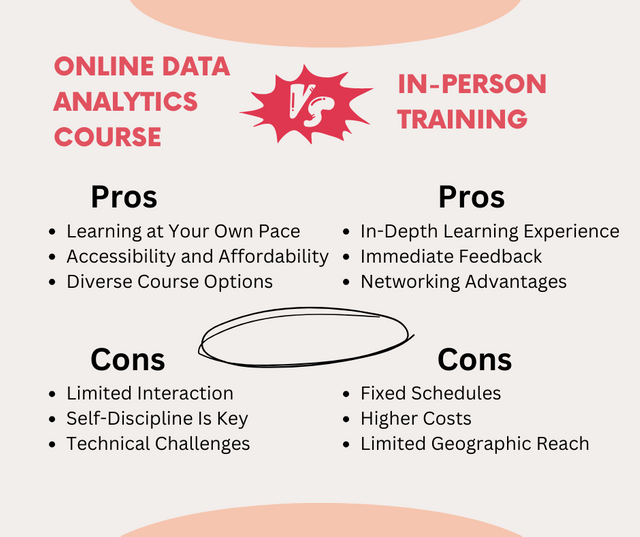In recent years, there has been a substantial increase in the popularity of online education, particularly in the realm of data analytics. Those who aspire to become data analysts or professionals looking to improve their skills now face a choice between online data analytics courses and traditional in-person programs. This article will delve into the advantages and disadvantages of both options, providing insights to assist you in making an educated decision about your data analytics education.

Understanding Online Data Analytics Courses
The Convenience Element
One of the key benefits of enrolling in online data analytics courses is the unmatched convenience they provide. Students have the ability to access course materials and lectures from virtually any location with an internet connection. This level of flexibility empowers individuals to effectively manage their studies alongside work, family, or other personal commitments.
Scheduling Freedom
Online courses offer the advantage of self-paced learning. You are in control of when you choose to engage in your studies, making it an ideal option for those with unpredictable schedules. This flexibility ensures that you can take your time to fully grasp intricate concepts.
Financial Considerations
Online courses often come with a more budget-friendly price tag compared to their in-person counterparts. You can save on transportation, accommodations, and, in some cases, even textbooks. It's a financially prudent choice for a wide range of learners.
In-Person Data Analytics Courses: The Traditional Approach
Direct Interaction
In-person courses facilitate direct interaction, allowing you to engage with instructors and fellow students face-to-face. This fosters a dynamic and immersive learning environment, contributing to a deeper understanding and valuable networking opportunities.
Structured Educational Setting
In-person programs feature well-structured schedules and a defined curriculum, guaranteeing a comprehensive education in data analytics. This method ensures an organized and effective learning experience.
Networking Possibilities
Participating in in-person courses opens the door to excellent networking opportunities. You can establish connections with instructors and peers, potentially leading to future job prospects or collaborative ventures.
Pros of Online Data Analytics Courses
Customized Learning Speed
Online courses empower you to tailor your learning pace according to your needs. If you encounter a challenging topic, you have the freedom to dedicate more time to it. Conversely, you can swiftly progress through content that you find more manageable.
Global Access and Cost-Effectiveness
Online courses are available to a worldwide audience, granting you the opportunity to choose from a diverse array of courses offered by different institutions without the necessity to relocate. This increased accessibility frequently translates to reduced expenses.
Varied Course Selection
You enjoy the flexibility to pick from a wide spectrum of online courses, ranging from fundamental introductions to advanced, specialized subjects. This variety enables you to fine-tune your education to align with your specific career aspirations.
Cons of Online Data Analytics Courses
Reduced Engagement
Online courses may not offer the same level of interaction as traditional classrooms. The absence of in-person exchanges could impact the depth of your comprehension and the progression of your communication abilities.
Self-Control Is Vital
Succeeding in online learning hinges on self-discipline. Without a fixed timetable, it's tempting to procrastinate or become easily sidetracked. Maintaining motivation and focus is crucial.
Technical Hurdles
A dependable internet connection and access to necessary technology are prerequisites. Technical glitches can disrupt your learning journey, and problem-solving can be time-intensive.
Pros of In-Person Data Analytics Courses
Comprehensive Learning Opportunities
In-person courses provide a deep and immersive educational experience, featuring real-time discussions and immediate feedback. This conventional method is ideal for individuals who excel in well-structured, interactive learning settings.
Instantaneous Guidance
Traditional classroom instructors are able to offer immediate feedback on your assignments and participation. This prompt interaction can greatly enhance your learning progress.
Networking Benefits
Attending in-person courses brings unique networking advantages. You have the opportunity to engage with instructors, guest speakers, and fellow students, potentially fostering valuable connections within your industry.
Cons of In-Person Data Analytics Courses
Set Timetables
Physical classes follow set timetables, posing difficulties for individuals leading busy lives. This might necessitate relocation or substantial time dedications.
Elevated Expenses
Conventional education frequently entails elevated tuition fees, travel costs, and textbook expenditures, making it a more substantial financial commitment.
Restricted Regional Accessibility
Physical courses are confined to specific locations. If you're not near educational institutions, you could encounter geographical obstacles to entry.
Which Option Is Right for You?
When you're faced with the decision of whether to opt for online or in-person data analytics courses, it's important to take the following factors into account:
Learning Style: Consider whether you thrive in a self-paced learning environment or if you prefer the structure of traditional classes.
Analyze Your Schedule: Determine if you can commit to fixed class times, or if you require the flexibility to fit your courses around a busy schedule.
Budget and Location:Assess your budget constraints and how your geographical location may impact your course options.
Ultimately, the choice you make should be tailored to your unique needs and preferences. Both online and in-person courses offer distinct advantages, so it's essential to select the one that aligns best with your goals.
Conclusion
Both online data analytics courses and in-person programs offer distinct benefits and drawbacks. Your choice should be based on your individual circumstances, preferred learning style, and career objectives. With the increasing demand for data analytics professionals, it's crucial that your education and career courses aligns with your aspirations of becoming a successful data analyst.